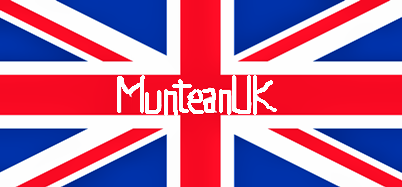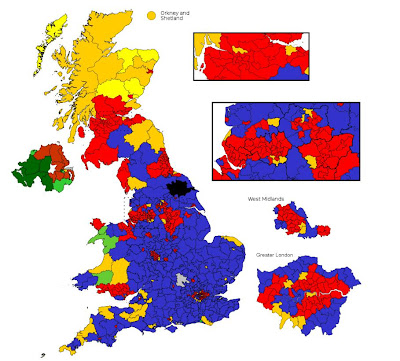 There are so many things that the Western civilised (?!) world can’t understand about Orthodoxy, that I had given up the idea of writing a blog post on this topic.
There are so many things that the Western civilised (?!) world can’t understand about Orthodoxy, that I had given up the idea of writing a blog post on this topic.Nevertheless, by God’s grace I came across an article*** which puts in a nutshell what I found so difficult to express. It’s written by Nana Devdariani, a famous Georgian journalist (and former state official), and it initially appeared in The Georgian Times.
Apart from some references to the political turmoil in Georgia, and to how Mikheil Saakahsvili (and probably his pupeteers from the USA) more or less ‘hijacked’ some symbols of Georgia, there’s something else I liked about this article.
It explains how un-Christian Western nations are compared to Georgia or to any Orthodox nation for that matter. It surely takes more for a nation to be Christian beyond St George’s (and England’s) flag kept on the UK’s Union Jack.
Be them the poorest, the most corrupt, the less civilised (and sadly, some of the most abortionist) nations, only Orthodox Churches have been blessed to hold on to the true teachings of Christ!
As individuals, we – the Orthodox believers – are often as spiritually sick as our Western contemporaries. We’re really no better, and while all heterodox may have excuses for their inequities after a millenium of heresies, we have almost none.
The secular nationalism of the West, and it’s array of humanist values are meaningless compared to the essence of Orthodoxy, which is not not just ‘another’ confession, among countless other – it’s the sole Truth left in this world.
We are often accused of being backward, and intolerant, yet many (not all) little Orthodox nations (not Tsarist, neither Putin’s Russia) have proven, throughout centuries, to be more tolerant than some ‘democratic’ societies of today.
I’m sure that some politically correct and brainwashed idiots who keep a watchful eye on this blog may be once more outraged by my claim that not all religions are good, and that there’s only ONE WAY to Salvation.
Our dreams of prosperity, of comfort, of understanding between nations, of solidarity, of world peace (and all the blah-blah-blahs) won’t save us! I’m not against any of these generous ideals; I only want to draw attention to how hypocritical they are.
The very people who are supposed to uphold them, trample on them behing closed doors, and within their hearts. Any of those people serving us the above values only care about themselves.
They are no saviours. The Lord has given us only One, and only once – some 2,000 years ago. It may appear irrational to affirm this for some many ‘wise people’ of today, but hell is full of ‘wise people’ who were sure (and taught others accordingly) that there is no hell.
Therefore, for those who have still got eyes to see, and ears to hear, I’m recommending the next article (whitin which I bolded some words):
The West cannot understand that Orthodox Christianity is not a confession – one among many others
Our politicians often note that Georgia and the West have ‘common values’. They say this so often that it has become a kind of slogan. The key motive for repeating such a statement is to make it an accepted formula, which people unthinkingly repeat without pondering its essence.
But this is a vitally important issue. Values per se define our place in the world, our perception of the world and our attitudes to each and all. Our values define life and often death. We all have seen the terrible pictures of naked Jews being brought to the Nazi concentration camps. Those who do not know what Erva means for Jews cannot guess that being naked is worse than death for a Jew.
The meaning of values is in reality a philosophical issue but we are witnessing their profanation and vulgarisation before our eyes. When a new article in the Criminal Code of Georgia on 'squealing' sparked a public outcry this was not a manifestation of a criminal mentality in society but something deeper, directly connected with our religious belief.
“Squealing” is not considered bad because people don't want to cooperate with the police but because Judas Iscariot did exactly this when he betrayed Jesus with a kiss. On the basis of religious values it can be readily deduced what will be acceptable to society and what not.
Different attitudes to sin are one of the differences between various religions.
Through competing with Protestants (and other denominations) for members the Catholic Church has started to abandon its positions step by step to become a more comfortable place to be. But this is not a new thing. It all started with selling indulgences – forgiveness of sins in exchange of money.
The Catholic Church has simplified the state of a believer and accepted that deep repentance is not absolutely necessary for sins to be forgiven. Rather the fear of sin, or slight repentance, is enough.
The practice of indulgences was not ‘invented’ out of the blue. It has a well-argued basis: Catholic belief states that God is angry with humans for their sins and will inevitably punish them, and therefore you have to do something for God to have your sins forgiven. It was merely a scholastic and technical issue to turn this doctrine into enabling people to pay for indulgences.
But paying in any form is unimaginable for an Orthodox. Sin drives men from God but God never leaves a sinner. God does not demand payment but a change of behaviour. Sin is not as simple an issue as it may seem at first glance. It is unacceptable for Orthodox to try and buy God’s mercy, to ‘bribe’ God and then go back to living the same life as before.
Although trading in indulgences was eventually condemned the Protestants took the next step when they began to recognise only two out of the 7 mysteries: baptism and eucharist, and rejected sacramental repentance through confession along with the remaining four (chrismation, ordination, marriage, anointing the sick).
I am not arguing that a Protestant does not repent at all. But repentance is not a holy mystery for a Protestant. Today both the Catholic Church and Protestants are more tolerant of sins, including those which contradict their own religions' morals and ethics. It is indisputable that nobody forces you to behave this or that way.
But the problem is that you cannot refuse to repent of your sins if you want to be called a believer. Western Christianity has met such 'believers' halfway already.
Affiliation with any religion does not grant someone an insurance against sin (and neither does atheism). Man is sinful in essence, but the difference between them lies in whether they repent of their sins or justify them.
If you look at the histories of Europe and Georgia, you will see a significant difference between the two. In Europe kings (or noblemen, dukes or other rulers) could change the religion of the people. In medieval Europe this principle was universal: whoever rules, theirs is the Church of the people.
This principle has not been applied in Georgia since Christianity was declared the state religion, even when Georgia had Moslem kings. The ‘wars of religion’ often cited by academics were mostly fought for political reasons, religion being just the packaging of political attempts to change the values of the people by force.
When talking about the historic tolerance of Georgians scholars often note that Jews were never murdered or harassed in Georgia. But this is an extreme simplification of the issue. Jews enjoyed the same privileges as Georgians did, and, more importantly, their property was protected, which is as important for a Jew as their personal protection.
Researchers often complain that there is a lack of records about Jews in Georgia, but this is because there were no separate regulations for them and they enjoyed the same rights as all other people.
The West cannot understand that Orthodox Christianity is not a confession – one among many others. It is a rule of existence and social organisation and its identification with being Georgian is so firmly established that you cannot even dispute it without stirring angry protests.
In 1888 Ilia Chavchavadze wrote: “Christianity, besides the actual Christian confession, means the Georgian soil, means being Georgian. Today in the South Caucasus Georgia and Christian are identical. They would say somebody had turned Georgian, rather than turned Christian [if a Moslem converted to Christianity here].
Our Church knows that land and nationality mixed with belief, intertwined with religion, form an insurmountable sword and shield before the enemy. This is what has helped this tiny country resist numerous foes! The Church has linked the land and nationality to belief and the nation has had this trinity as a guide through 1,500 years of war and bloodshed. This trinity preserves the homeland and Georgian identity for a Georgian.”
Words and deeds often differ in politics but we also often cannot link issues which are rings in the same chain of logic. For instance, when the President says that his political idol is Kemal Ataturk he should remember that the Moslem religious schools were closed under Ataturk, teaching religious discipline was banned and religious symbols and clothes was forbidden.
In 1925 the Darwish brotherhoods were abolished. Ataturk expelled the Ecumenical Patriarch from Constantinople. In 1928 Article 2, which stated that Islam was the state religion, was removed from the Constitution.
Let’s remember 2002-2003 when the newly established Government raised five-cross flags with the slogan: “Let’s regain Georgia!” For many people this was a signal that the National Movement was nationalist and an Orthodox political force was coming into power. Many would even note: “I do not follow Misha but the five-cross flag!”
But in reality if you had looked at the past and present of that movement you would have seen that its nationalism meant no more than citizenship of Georgia and its Orthodoxy the equality of the national Faith with all the other confessions.
The attempt by the opposition to play the same card is again a false promise, as they have the same values as the National Movement and it cannot be otherwise, as the West they court teaches a different type of nationalism and does not teach Orthodox Christianity.
The message of the National Movement which people misinterpreted was absolutely understandable and acceptable for the Western political elite. The five-cross flag, which is associated with the Crusaders, was a signal that the people holding these flags would also be 'crusaders'.
The colours of the flag are the traditional colours of Coca-Cola, and have been established in the Western mentality as such for half a century. As for Christianity, the US still calls itself a Christian country but this is as far from the truth as Western Christianity is from Orthodoxy.
The symbol of the National Movement which has become the state symbol was well-thought out and has achieved its goal. But this goal did not have anything common with the hopes and desires of the people who thought that the symbol was designed for them.
*** NOTE: I’m afraid I couldn’t post an active link here, but any Google search with the name of the article usually finds it.
[For all the posts on this blog go to/Pentru toate postările de pe acest blog mergi la: Contents/Cuprins]
















































